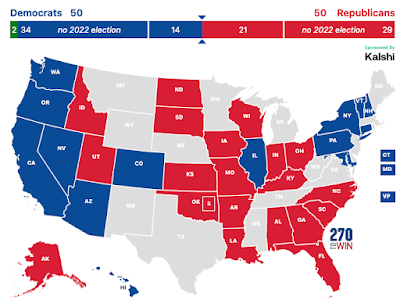Think Legally, Act Politically: What to Expect for Gay Marriage Before the USSC
The
Supreme Court is considering two cases on gay marriage this week. First, it
considered California’s Prop 8, that banned gay marriage in that state and also
a case on the federal Defense of Marriage Act. Proponents of gay marriage have
looked forward to these hearings for months, hoping that the court is ready to
make gay marriage The Law Of The Land. However, the questions asked by justices
have
sent mixed messages. So what should we expect?
Gay
marriage proponents have been making two key arguments. First, this is a civil
rights issue, and the justices need to ensure equal protection before the law.
Second, public opinion has rapidly shifted in favor of gay marriage, and this
has been reflected in a number of political elites switching their positions as
well. According to Chief Justice Roberts: “As far as I can tell, political figures are falling over
themselves to endorse (the gay marriage) side of the case.” Protesters
lined the steps of the Court, demonstrating the shift in public opinion and this
has led some political scientists, arguing that the court is responsive to the public,
to conclude that it may decide in favor of the gay marriage position. (See Tom
Clark on the Monkey Cage for a good explanation of the argument).
For this blog, I’d like to offer some political commentary on what is
ultimately a judicial matter. But my
assumption is that the justices act in a political manner and find the judicial
justifications they need.
Ultimately, there’s a menu of outcomes available
to the justices:
- Making gay marriage The Law Of The Land (The Civil Rights argument)
- Removing the federal ban of gay marriage (this and the following are considered “Federal” options)
- Striking down California only
- Just addressing the eight states that allow gay and lesbian couples benefits but not marriage (see the “eight-state” solution on this SCOTUSBlog)
- Maintaining the status quo
As mentioned, coming into this week proponents of
gay marriage were hoping for The Law Of The Land, outcome leaning on the public
opinion argument. However, I think there’s an inherent tension between the justification
for this argument (protecting the rights of the minority) against the argument
for it (we have an overwhelming majority that support us!). Which is it, a
minority or a majority?
Does this mean it’s an inherently bad argument? No, I don’t
think so, but I don't know much about the law. However, as the justices consider the political reactions to those options, making gay
marriage The Law Of The Land may turn out to be a bridge too far.
Why? Because as much as justices may respond to
public opinion, their recent actions suggest they will act with the interests
of the court’s institutional standing in mind. Consider Roberts’ switch on
Obamacare: did he do it for partisan/political reasons? I find that
unlikely. However, Roberts found a
middle pathway between grasping for a positive policy action (upholding the
individual mandate through the commerce clause) and striking down the legislative action altogether (which would have
had a huge political backlash in an election year).
With that decision the Supreme Court was able
to maintain its position as final say in the public policy process. Roberts in particular
was able to shed his label as a lackey for conservative arguments, and as a
result the Court emerged from the 2012 electoral cycle with its political
legitimacy intact.
So which outcome should we expect this time?
Once again the middle-ground. The Court may wipe out some of the more egregious
legislation (DOMA is in trouble. Banning state-level bans?), and if public
opinion is really as strong as it is argued, the Court can leave that to the
people and their representatives to sort it out. It may be an unsatisfying
outcome for supporters, but we live in a republic, and this will shift the
battleground back to the political.


